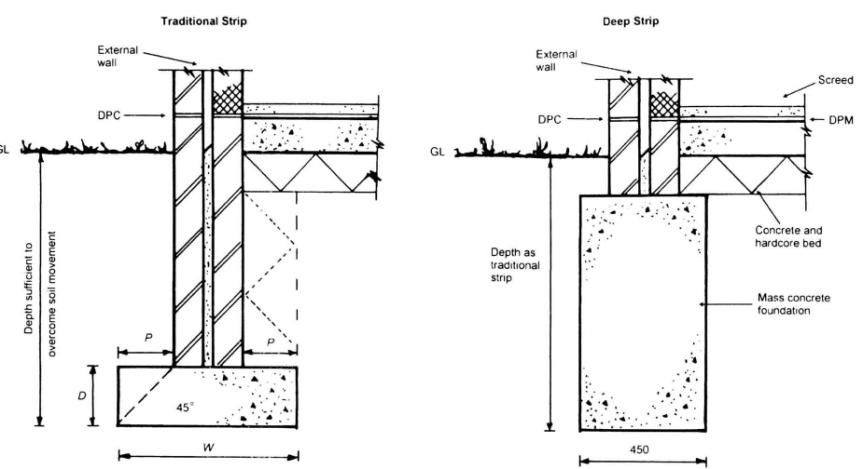Stepped foundation
Foundations provide support for structures, transferring their load to layers of soil or rock that have sufficient bearing capacity and suitable settlement characteristics.
Strip foundations (or strip footings) are a type of shallow foundation used to provide a continuous, level (or sometimes stepped) strip of support to a linear structure such as a wall or closely-spaced rows of columns built centrally above them.
Where the natural surface of the ground is sloped, the most economical solution may be a stepped foundation. In this case, the foundation takes the form of a series of concrete horizontal steps following the slope of the ground.
This helps to minimise the amount of excavation and below-ground wall construction that would otherwise be required. Stepped foundations can also be used to transition from deep foundations to shallow foundations, and at corners and intersections.
Regularly stepping foundations also avoids abrupt and excessive changes in level that could cause a weakness resulting in movement. Similarly, abrupt and excessive changes in foundation depths should be avoided at corners and intersections by the introduction of stepping.
Each step in the foundation should be no higher than the thickness of the foundation. The foundation at the higher level should also overlap the lower foundation, typically by at least twice the height of the step, or by the thickness of the foundation, or by at least 300 mm (whichever is greatest).
Drainage must be carefully designed to eliminate the danger of instability due to accumulating water pressure.
[edit] Find out more
[edit] Related articles on Designing Buildings Wiki
Featured articles and news
Moisture, fire safety and emerging trends in living walls
How wet is your wall?
Current policy explained and newly published consultation by the UK and Welsh Governments.
British architecture 1919–39. Book review.
Conservation of listed prefabs in Moseley.
Energy industry calls for urgent reform.
Heritage staff wellbeing at work survey.
A five minute introduction.
50th Golden anniversary ECA Edmundson apprentice award
Showcasing the very best electrotechnical and engineering services for half a century.
Welsh government consults on HRBs and reg changes
Seeking feedback on a new regulatory regime and a broad range of issues.
CIOB Client Guide (2nd edition) March 2025
Free download covering statutory dutyholder roles under the Building Safety Act and much more.
AI and automation in 3D modelling and spatial design
Can almost half of design development tasks be automated?
Minister quizzed, as responsibility transfers to MHCLG and BSR publishes new building control guidance.
UK environmental regulations reform 2025
Amid wider new approaches to ensure regulators and regulation support growth.
The maintenance challenge of tenements.
BSRIA Statutory Compliance Inspection Checklist
BG80/2025 now significantly updated to include requirements related to important changes in legislation.
Shortlist for the 2025 Roofscape Design Awards
Talent and innovation showcase announcement from the trussed rafter industry.

























Comments
What are the rebar design standards for stepped footing rebar?
are 90 degree hooks at step down acceptable?